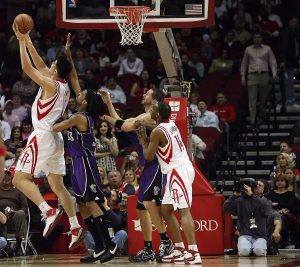The corporate athlete: are you in the ideal performance state?
The world of commercial property restoration is constantly in a state of reaction. A call comes in, the crews roll out and everything you had just planned to do that day has changed. The terms ‘after hours,’ ‘overtime,’ and ’emergency call’ are second nature to our people and the demands of our industry are taxing on our mental and physical well being. This is my professional sport that I compete in every day.
Jim Loehr and Tony Schwartz discuss the throes of modern corporate demands in their Harvard Business Review article titled The Making of a Corporate Athlete. Their article introduces the concept of reaching the “Ideal Performance State” where the body and mind can operate at optimum levels over extended periods of time. Their theory of applying the rituals of high-level athletes to our modern corporate world has been a game changer for our people at BluSky Restoration.
Your Professional Sport
The rigors of our professional lives are somewhat uniform across industries. These stresses have been exacerbated by the immediacy and speed at which technology further pushes our capacities. Not too dissimilar to how professional athletes continue to get stronger, faster and smarter. While these advances are correlated across the worlds of professional sports and corporate America – there are many differences between how a professional athlete prepares and competes in their sport and how a corporate athlete plays their game.
The Ideal Performance State
Loehr and Schwartz describe the Ideal Performance State as a flow of action where “physical well-being is its foundation… above that resting emotional health, then mental acuity and at the top, a sense of purpose.” These four capacities (Physical Capacity, Emotional Capacity, Mental Capacity and Spiritual Capacity) when working in unison, generate the Ideal Performance State.
The Physical Capacity – The Foundation
 The rituals that we practice to enhance physical capacity can help us battle fatigue, irritability, difficulty concentrating and a lack of emotional resilience. Their basic strategy is simple: “actually do all those healthy things you know you ought to do.” The article discusses the benefits of a proper diet, intermittent training, recovery and positive daily rituals.
The rituals that we practice to enhance physical capacity can help us battle fatigue, irritability, difficulty concentrating and a lack of emotional resilience. Their basic strategy is simple: “actually do all those healthy things you know you ought to do.” The article discusses the benefits of a proper diet, intermittent training, recovery and positive daily rituals.
World-class athletes spend most of their time practicing and only a small amount of time performing. The corporate athletes devote most of their time performing, often 12 hours at a time, with very little rest or recovery. Loehr and Schwartz suggest, “five sources of restoration: eat something, hydrate, move physically, change channels mentally and change channels emotionally.”
Emotional Capacity – Our Internal Climate
Picture a time when you were at peak performance and finding success. Most likely you were calm, confident and having fun! We see this on the faces of our most admired athletes when they are in their Ideal Performance State. Unfortunately, the opposite is true for a negative emotional capacity. We can get mired in obsessive thinking, worrying and rest-inhibiting stress.
Fortunately, there are tools and rituals that help us manage our emotional well-being in the corporate environment. They can be as simple as listening to music, breathing exercises, and visualization. Loehr and Schwartz also remind us how important our personal relationships are to our Emotional Capacity and encourage us not to stint on our time with loved ones.
Mental Capacity – Step off the Endless Treadmill
There are no shortages of distractions as a Corporate Athlete. While we are competing at our sport our cellphones are ringing, emails are popping up and emergencies are constantly being imposed on us. Have you ever seen an NBA player with their cellphone at court-side? When the professional athlete is competing, they are focused and have cognitive clarity.
Have you ever had your day, week or month completely absorbed in a “perpetual state of triage?” Stepping back and clearing your mind is the prescription according to Loehr and Schwartz. They ask, “have you ever suddenly found the solution to a vexing problem while doing something mindless…?” Look at Warren Buffett, who “insist(s) on a lot of time being spent, almost every day, to just sitting and thinking.” He asserts he makes “less impulsive decisions than most people in business.”
Spiritual Capacity – A Higher Purpose
 Atop the pyramid of the “Ideal Performance State” sits the spiritual capacity, a powerful source of motivation for performing at high levels over an extended period. Loehr and Schwartz clarify this capacity as, “the energy that is unleashed by tapping into one’s deepest values and defining a strong sense of purpose.”
Atop the pyramid of the “Ideal Performance State” sits the spiritual capacity, a powerful source of motivation for performing at high levels over an extended period. Loehr and Schwartz clarify this capacity as, “the energy that is unleashed by tapping into one’s deepest values and defining a strong sense of purpose.”
It is important to spending time reflecting and thinking about our individual values and purpose. The spiritual capacity keeps corporate athletes motivated, focused, determined and resilient. In the words of Harry Kramer (former CEO of Baxter International Inc. and currently professor of management and strategy at Northwestern University’s Kellogg School of Management) there is no work/life balance, as work is a part of our life. The spiritual capacity is the bridge that ties the two together.
You are what you repeatedly do
In a world of information overload and self-proclaimed experts around every social media corner, this article stood out to our team as a recipe for success in our sport of commercial restoration. While we cannot expect the external influences to change the burden of our workday tomorrow, the practices within “The Making of a Corporate Athlete” have certainly proven to make us more equipped to take on the next day’s challenges. As Loehr and Schwartz reference Aristotle, “You are what you repeatedly do.” Fortifying our bodies, minds and purpose through positive daily rituals, will make us a more resilient Corporate Athlete in the future.
Suggested Reading:
The Power of Now by Eckhart Tolle
Relentless by Tim Grover


